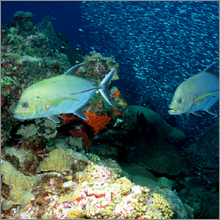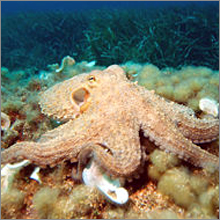Africa: And then there were no fish
|
In the not-too-distant future, several African countries will face the
reality of collapsed fisheries and the permanent degradation of their
marine environment, a new report has warned.
"This in turn will continue to adversely impact on food-security and economic development, with coastal communities dependent on fishing being the hardest hit," noted The Crisis of Marine Plunder in Africa, published by the Institute for Security Studies (ISS), a regional think-tank.
Poaching and overfishing in a number of African countries could lead to collapsed stocks and cause permanent damage to the marine environment, according to Andre Standing, author of the new ISS study. Some of these are issues also highlighted in the UN Environment Programme's (UNEP) Global Environment Outlook 4 (GEO-4).
"While the demise of marine biodiversity is not a peculiar problem for underdeveloped countries, there are strong reasons to suspect that once abundant fish stocks and marine biodiversity situated in the Exclusive Economic Zones (EEZ) of African countries are threatened," said Standing.
Exploitation of West Africa's fish resources by European Union (EU), Russian and Asian fleets "increased sixfold" between the 1960s and 1990s, the GEO-4 report noted. "Much of the catch is exported or shipped directly to Europe, and compensation for access is often low compared to the value of the landed fish."
Standing said that the problem did not "stem largely from rogue fishing companies who evade laws and break regulations with impunity", but "vested interests" that allowed this situation to occur, and that these "vested interests span not only foreign governments and inter-governmental organisations, but also African elected leaders and public officials".
Critical source of protein
The UNEP report points out that fish is a critical source of animal protein in poor countries; globally it provides more than 2.6 billion people with at least one-fifth of their average per capita animal protein intake. "Fish accounts for 20 percent of animal-derived protein in Low-Income Food Deficit (LIFD) countries, compared to 13 percent in industrialised countries, with many countries where overfishing is a concern also being LIFD countries."
Standing cited the 2005 British Marine Resources Assessment Group, which "provided a conservative estimate that illegal, unreported and unregulated fishing in Africa could be valued at approximately US$1 billion every year".
"It was estimated that in Somalia the total annual value of illegal fishing in only the tuna and shrimp industries amounted to $94 million. In Angola illegal fishing was measured in the sardine and mackerel fisheries to be roughly $49 million annually, which equates to 21 percent of the total value of Angolan fish exports. In Mozambique, illegal fishing in the tuna and shrimp industry was set at approximately $38 million."
These quantities were "comprehensible", Standing wrote, "when one considers that in South Africa, for example, over a two-year period in the early 2000s some 320,000 tonnes of Patagonian Toothfish were harvested, whilst the annual Total Allowable Catch was set by the government at only 450 tonnes.
"Likewise, in 2001, in one single incursion, long-line fishing vessels from Taiwan illegally entered Tanzania's EEZ and took approximately $20 million worth of tuna."
Trade liberalisation
Fisheries access agreements, which allow foreign vessels into local fishing grounds, adversely affect fish stocks, reduce artisanal catches, and affect the food security and well-being of coastal West African communities, according to the GEO-4. Many of these agreements came into effect after the countries were pressured to liberalise trade.
Much of the catch is exported or shipped directly to Europe, and compensation for access is often low compared to the value of the landed fish
In Mauritania the fisheries sector is predominantly influenced by the terms of the Cotonou Agreement, which binds the 79-member African,Caribbean and Pacific (ACP) group to the EU. "Cotonou provides for all ACP exports a customs-free entry to the European market. This has led to an export-oriented development of the fisheries sector," said Anja von Moltke, of UNEP's Division of Technology, Industry and Economics, in a study on Mauritania.
"Mauritania's trade liberalisation measures are primarily characterised by a dismantling of customs duty on imports and exports, state redrawing of both public fisheries processing facilities, and numerous bilateral fisheries agreements with Algeria, Japan, Morocco, Russia, Senegal, Tunisia and the EU."
The increased export revenue brought by trade liberalisation has helped reduced the national debt, but it has had a negative impact on food consumption and poverty reduction, "resulting in a situation of high dependence of the fisheries sector on these foreign financial payments," von Moltke said.
Studies have also shown the environmental costs: a large number of Mauritania's main fish stocks have decreased significantly over the past years, with many already being overexploited or close to overexploitation, the author commented. "The octopus stock, for example, is currently being overexploited by 24 to 40 percent."
Job losses
Economically, the biggest repercussions in developing countries have been lost job opportunities and hard currency revenues, said the GEO-4 report. "After processing in Europe, the end value of seafood products from these resources is estimated at about $110.5 million, illustrating a huge disparity in value of the resources taken by EU companies and the licence fee paid to the countries, which is only 7.5 percent of the value of the processed products."
The case study on Mauritania found that it processed only 12 percent of its catch. "This has several far-reaching impacts. First, it leads to a real disconnection between the production system under access agreements and the Mauritanian system. Second, there is no investment in Mauritania's processing facilities, remaining uncompetitive.
Increased exports have lead to a lack of fish in local markets, particularly high-value fish, which has affected prices and led to the substitution of fish for poultry, which was now cheaper than fish. Von Moltke also found that traditional fish species were being replaced by new types of lower value species.
The GEO-4 report pointed out that overexploitation of fish was having a long-term impact on livelihoods and had forced artisanal fishers from coastal West Africa to migrate to some of the regions exploiting their resources. "Senegalese fishers emigrating to Spain claim the reason for leaving their homes is the lack of their traditional fisheries livelihood."
Action needed
Standing said, "Although the solution to overfishing requires action on an international level, it does seem clear that African countries can do much more to improve the situation; it is not simply the case that African states lack the capacity to do more to protect their marine resources, although this is a major problem.
"What seems important to understand is that overfishing and some forms of illegal fishing flourish due to corruption and expediency by those in public office or government," he claimed.
The GEO-4 report said further action would be needed to induce governments to increase their political commitment to reduce fishing efforts globally, and to provide funds for regional fish-management bodies.
Source: www.allafrica.com












